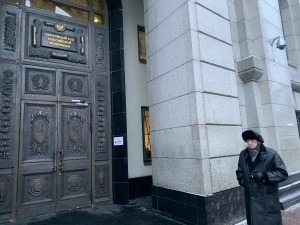As reported before, the Tula Region Court has ruled that it is lawful to restrict access by researchers and the public to the minutes of the Special Troika, the body responsible during the last stages of the Great Terror (1937-1938) for sentencing hundreds to death without investigation or trial.
The text of this ruling, writes Sergei Prudovsky, makes the following assertions:
1. “The date for applying for access has expired …” This statement is incorrect both in terms of the law and the circumstances of the cases;
2. Releasing such information would pose “a threat to the security of the Russian State, to its constitutional system and to the morality, health, rights and legal interests of other persons”;
3. Releasing such information falls under the “ban on spreading information that: [a] could promote war; [b] might incite ethnic, racial or religious hatred and enmity; or [c] is liable to punishment with fines or imprisonment”.
An appeal against this “nonsense” will be submitted before the legally-established deadline by defence attorney Andrei Fedorkov and Memorial lawyer Natalya Sekretaryova.
*
During the Great Terror almost nine thousand people were arrested in the Tula Region: 7,678 were condemned to be shot (2,195) or sent to the Gulag (5,484) on the orders of the regional troika established in October 1937 and the two-man commission or dvoika in Moscow (see the Tula Memorial Society’s website, “The Regional NKVD troika” [R]). Finally, to deal with the backlog of tens of thousands arrested across the USSR, “Special” Troikas were set up in September 1938 in the USSR’s Regions and Republics.
(For a more detailed account of the operation of these three extra-judicial bodies and the charges laid against their victims, see the evidence compiled in Karelia over the past thirty years.)
Continue reading

